OPTIMAL SEA MOSS DOSAGE: HEALTH GOALS GUIDE


The recommended dosage of sea moss can vary based on various factors like the form of sea moss you are using (gel, powder, raw), your age, health status, and the specific purpose for which you are using it. Generally, the following guidelines can be considered:
- Raw Sea Moss: If you are consuming raw sea moss, it's common to limit the amount to about 1-2 tablespoons per day. This is usually soaked and then blended into a gel.
- Powdered Sea Moss: When using powdered sea moss, a typical dosage might be around 1 teaspoon per day, which can be mixed into various foods or drinks.
- Capsules or Pills: If you're taking sea moss in capsule or pill form, follow the dosage instructions provided on the product label, as the concentration can vary.
Remember, these are general guidelines, and it's important to consider your own health and dietary needs. If you have any specific health conditions or are taking other medications, it's advisable to consult with a healthcare professional before adding sea moss to your diet to ensure it's safe and appropriate for you. Additionally, starting with a lower dose and gradually increasing it can help you monitor how your body reacts to sea moss.
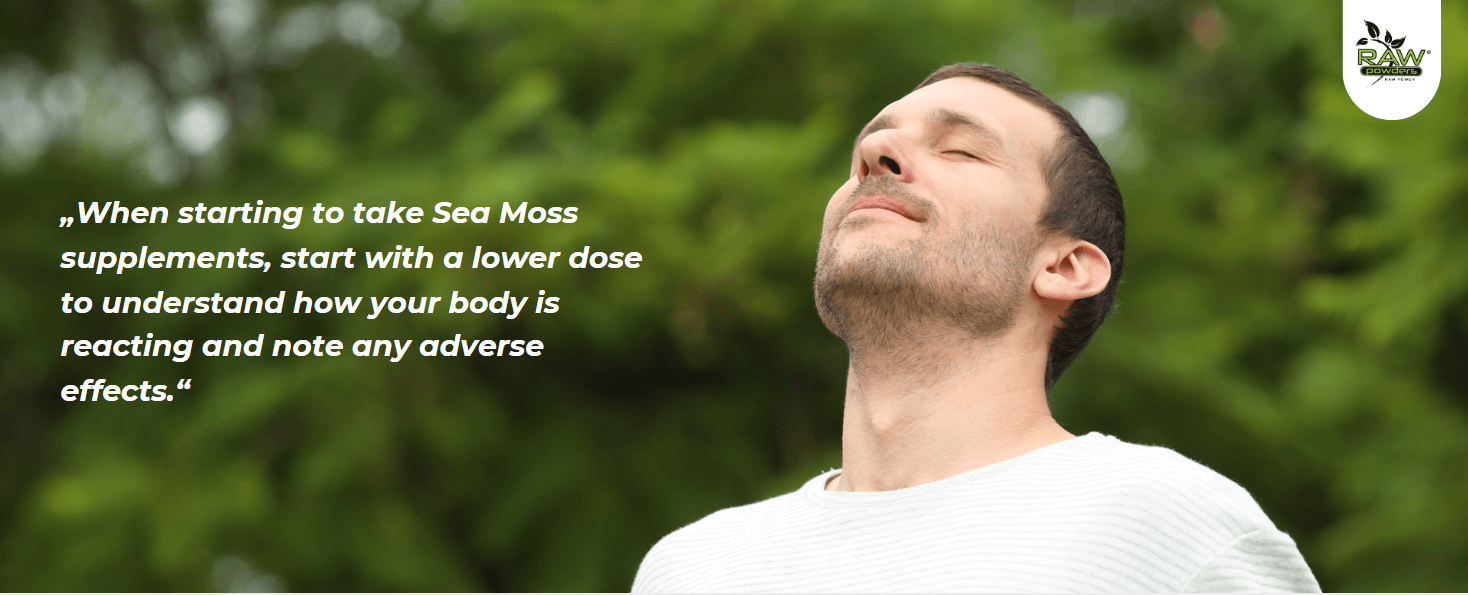
What is the recommended dosage of sea moss, depending on the different medical purposes?
Sea moss is used for various health purposes, each of which may have different recommended dosages. It's important to note that while sea moss is a popular supplement, scientific evidence supporting specific dosages for different medical purposes is limited. The following recommendations are based on general practices and should not replace professional medical advice:
- General Health and Nutrition: The usual dose is 1 teaspoon of Sea Moss powder.
- Digestive Health: To help regulate digestion, it is recommended to take Sea Moss mixed into food or drinks. It is known that an imbalance of gut bacteria has been linked to the development of disorders such as inflammatory bowel disease, immunodeficiency, hypertension, type-2-diabetes, obesity, and cancer. In vitro, animal studies show that the consumption of seaweed components may have the potential to beneficially modulate the microbiota of the mammalian gut. Seaweed polysaccharides have shown particular efficacy as modulators of the gut by acting as prebiotics, which increase gut bacterial numbers and the production of short chain fatty acids. Although it is necessary to take into account that although in vitro studies and in vivo animal trials are an indication of the prebiotic potential of seaweed components, they are not fully representative of how the component will be metabolized in humans [1].
- Weight Loss: While not a magic solution for weight loss, sea moss can be used as a low-calorie source of essential nutrients. The dosage remains similar to that for general health.
- Skin Health: For topical use, sea moss is often applied directly to the skin in gel form. There isn't a specific dosage for topical application, but a thin layer applied to the affected area is typical.
- Thyroid Support: Iodine insufficiency is now a prominent issue in the UK and other European countries due to low intakes of dairy products and seafood (especially where iodine fortification is not in place). It was shown that seaweed is palatable and acceptable to consumers as a whole food or as an ingredient, and effective as a source of iodine in an insufficient population [2]. However, the amount of iodine in sea moss can vary greatly, so it's essential to consult with a healthcare provider to determine the appropriate amount.
- Immune Support: As with general health, 1-2 tablespoons of sea moss gel or 1 teaspoon of powder daily is often used.
- Respiratory Health: The mucilaginous nature of sea moss can potentially help with respiratory conditions. Again, the standard dosage applies.
When using sea moss for any medical purpose, there are several important considerations:
- Consult Healthcare Professionals: Always consult with a healthcare provider before starting any new supplement, especially if you have existing health conditions or are taking other medications.
- Monitor for Side Effects: Start with a lower dose to see how your body reacts, and be aware of any adverse effects.
- Quality of Sea Moss: The source and quality of sea moss can affect its nutrient content and potential benefits. Ensure you're using a reputable source. You can read about the benefits and advantages of Sea Moss in the blog - Sea Moss benefits.
- Iodine Content: Because sea moss contains iodine, it's crucial not to consume too much, particularly for individuals with thyroid conditions.
These recommendations are general guidelines and may not be suitable for everyone. Individual needs can vary greatly, so personalization based on one's health status and needs is important.
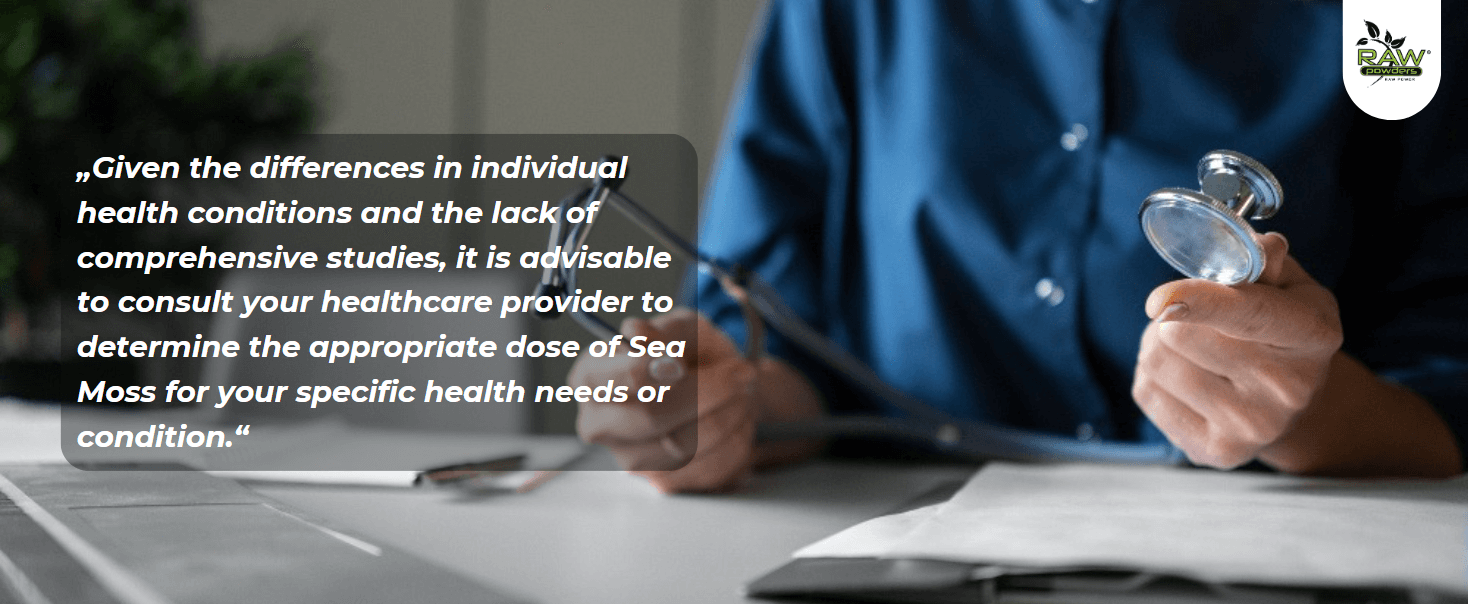
Studies and references
The scientific research on the recommended dosage of sea moss for different health purposes is somewhat limited, and the studies that do exist mainly focus on the general safety and potential benefits of sea moss without specifying dosages for specific medical conditions. Here are relevant studies that discuss the safety of sea moss, its potential benefits for weight management, and the effects of dietary fiber on hunger regulation:
- General Safety of Sea Moss: A study published in Environmental Science and Pollution Research found that the consumption of 4 grams per day of Irish moss (a type of sea moss) does not pose a significant health risk. The research emphasized the importance of adhering to recommended dosages to avoid excessive iodine intake, which could exceed the tolerable upper intake level (UL) for iodine [3].
- Sea Moss and Weight Management: A review in the American Journal of Clinical Nutrition highlighted that dietary fiber intake, including fibers from seaweeds like sea moss, is associated with decreased body weight, body fat, and waist circumference. The study suggested that fiber supplementation might help improve body composition and glycemic control in overweight and obese individuals [4].
- Dietary Fiber and Hunger Regulation: A systematic review in Obesity Reviews examined the effects of different types of dietary fiber on appetite, energy intake, and body weight. It concluded that viscous fibers, like those found in sea moss, can reduce appetite and energy intake, potentially aiding in weight management. The review emphasized that the effects might vary based on the type and properties of the fiber [5].
- Safe Dosage for General Use: Another study mentioned by the Cleveland Clinic suggested that 4 grams of sea moss per day is typically safe, but they advise consulting a healthcare provider before taking it, especially for those with thyroid conditions like hyperthyroidism or hypothyroidism [6].
These studies provide a general idea of the safety and potential benefits of sea moss but do not offer specific dosages for different medical purposes. Given the variability in individual health conditions and the lack of extensive research, it's advisable to consult with a healthcare provider to determine the appropriate dosage of sea moss for your specific health needs or medical conditions.
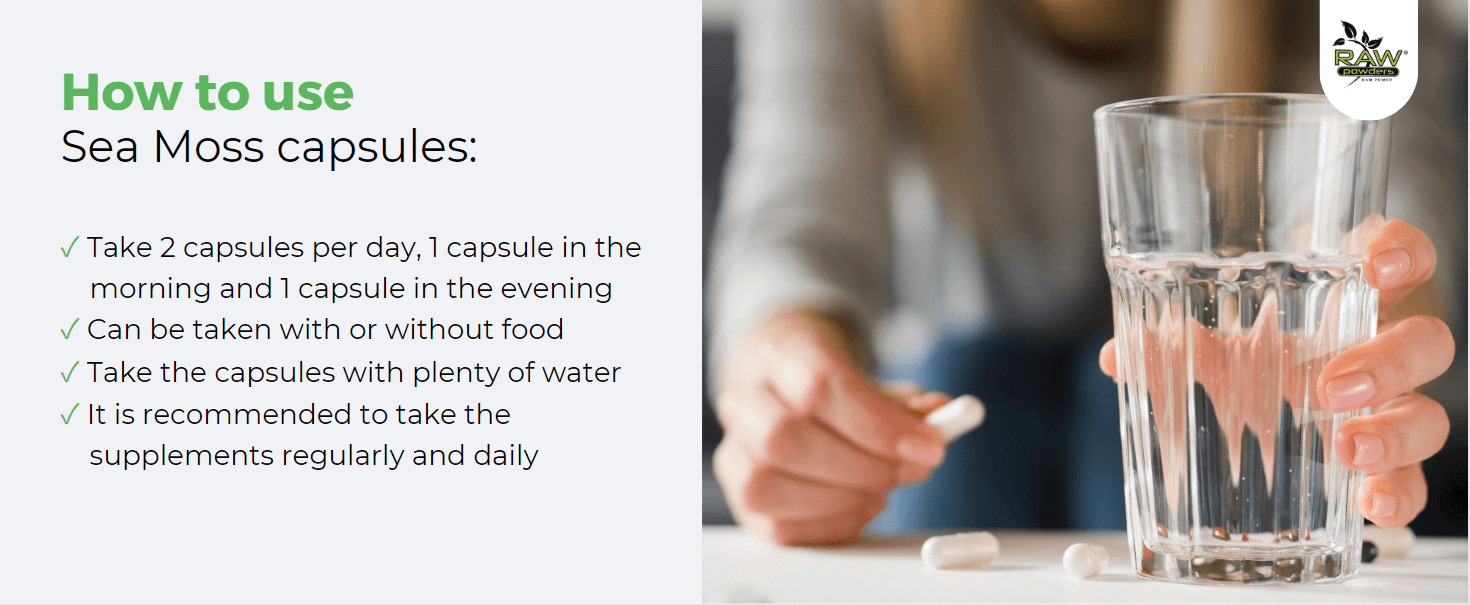
When and how should you take Sea Moss?
Irish Moss seaweed extract is particularly easy to take in capsule form. Each Raw Powders Sea Moss capsule contains a consistent dosage of 250mg of Sea Moss.
The Sea Moss capsules can be taken with or without food, depending on your preference, but it is advisable to consume it with plenty of water - ideally one to two glasses.
For healthy adults without specific symptoms, the standard daily dosage of Irish Moss seaweed is two capsules. In general, it is recommended to take one dose in the morning and one in the evening, regularly and daily.
Since individual responses to Sea Moss can vary, it is important not to initially exceed the recommended dosage but wait for the body's reactions. It can take several days before a positive effect is noticeable.
Sea Moss Red Algae Extract is particularly popular with vegan diets because sea algae contain a high proportion of omega-3 fatty acids, all essential vitamins, minerals and iodine. Of course, Raw Powders capsules are suitable for vegetarians and vegans.
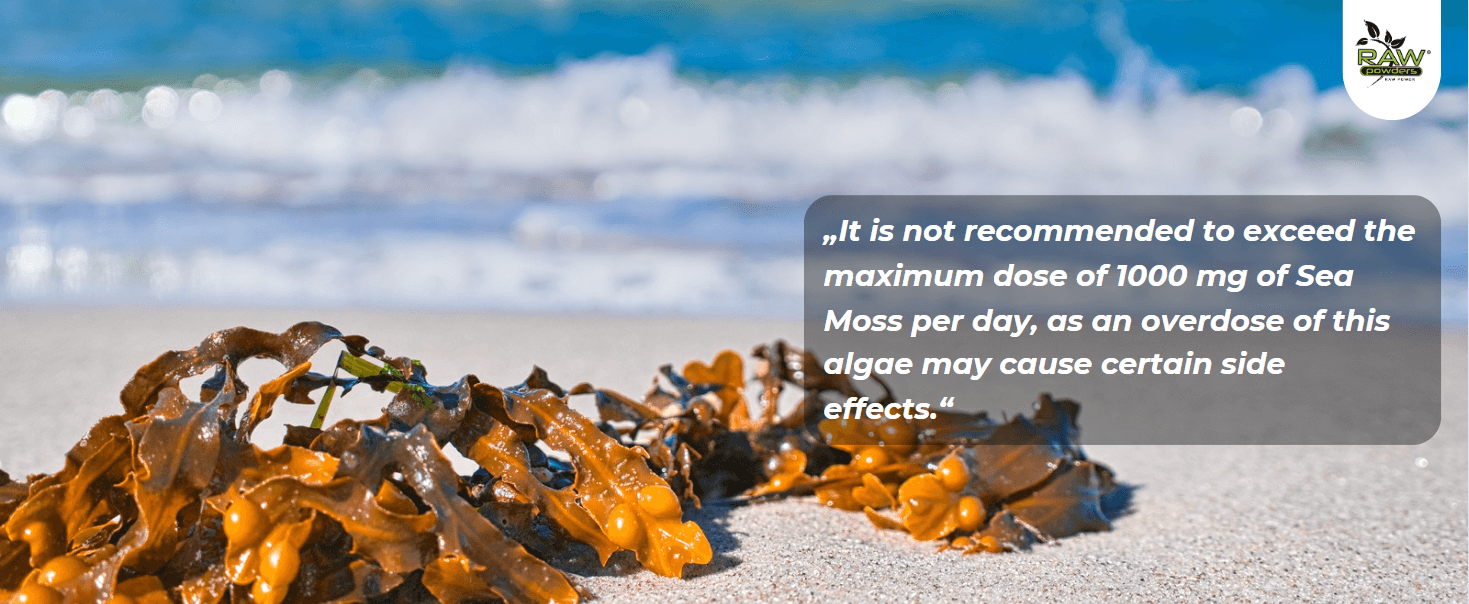
Is an overdose of Sea Moss dangerous?
The Carragheen algae or Irish Moss have an extremely high content of vitamins and nutrients, including vitamins A, E, F, and K and calcium, potassium, sulfur and iodine. But: a lot does not always help a lot.
Although Sea Moss is very healthy, one should never exceed the maximum dosage of 1000mg of seaweed, because an overdose of Irish Moss can also be unhealthy in certain pre-existing conditions.
For more details on the possible side effects of taking Sea Moss, see the blog post - Sea moss side effects.
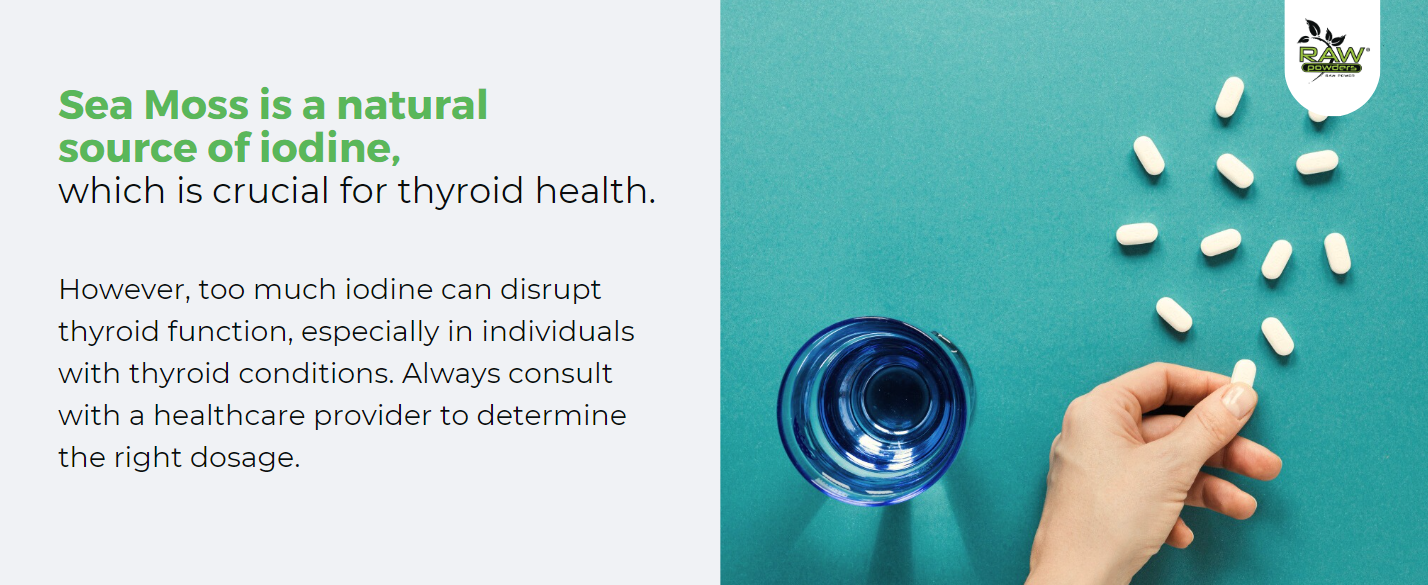
It can be particularly problematic with the component iodine. People who suffer from thyroid diseases must pay close attention to their iodine balance. Too much or too little can disrupt thyroid function and should therefore always be monitored medically.
The same applies to using Irish Moss or iodine to support conception. The hormonal function of the thyroid gland is essential. However, the appropriate dosage of Irish Moss as a supportive measure should always be discussed in advance with the patient’s healthcare providers.
Medical Disclaimer
The information provided in our articles is solely for educational purposes and should not be considered medical advice or instruction. No action or inaction should be taken based solely on the contents of this information. Readers should consult their health care professional on any matter related to their health and well-being. The information and opinions provided here are believed to be accurate and sound, based on the best judgment available to the authors, but readers who fail to consult with appropriate health authorities assume the risk of any injuries. The publisher is not responsible for errors or omissions.
Please be aware that different countries may have specific regulations and that this disclaimer does not replace the need for consultation with a healthcare provider before beginning or changing a treatment or supplement regimen. The information contained in this article is not intended to diagnose, treat, cure, or prevent any disease. Individual results may vary.
References
- Emer Shannon, Michael Conlon, Maria Hayes. Seaweed Components as Potential Modulators of the Gut Microbiota. Review Mar Drugs. 2021 June 23;19(7):358. doi: 10.3390/md19070358. PMID: 34201794 PMCID: PMC8303941. https://pubmed.ncbi.nlm.nih.gov/34201794/.
- Emilie Combet, Zheng Feei Ma, Frances Cousins, Brett Thompson, Michael E. J. Lean. Low-level seaweed supplementation improves iodine status in iodine-insufficient women. Br J Nutr. 2014 Sep 14;112(5):753-61. doi: 10.1017/S0007114514001573. Epub 2014 Jul 9. PMID: 25006699. https://pubmed.ncbi.nlm.nih.gov/25006699/
- Darias-Rosales, J., Rubio, C., Gutiérrez, Á., Paz, S., & Hardisson, A. (2020). Risk assessment of iodine intake from the consumption of red seaweeds (Palmaria palmata and Chondrus crispus). Environmental Science and Pollution Research, 27, 45737 - 45741. https://doi.org/10.1007/s11356-020-10478-9.
- Thompson, S., Hannon, B., An, R., & Holscher, H. (2017). Effects of isolated soluble fiber supplementation on body weight, glycemia, and insulinemia in adults with overweight and obesity: a systematic review and meta-analysis of randomized controlled trials.. The American journal of clinical nutrition, 106 6, 1514-1528 . https://doi.org/10.3945/ajcn.117.163246.
- Wanders, A., Borne, J., Graaf, C., Hulshof, T., Jonathan, M., Kristensen, M., Kristensen, M., Mars, M., Schols, H., & Feskens, E. (2011). Effects of dietary fibre on subjective appetite, energy intake and body weight: a systematic review of randomized controlled trials. Obesity Reviews, 12. https://doi.org/10.1111/j.1467-789X.2011.00895.x.
- Javier Darias-Rosales, Carmen Rubio, Ángel J. Gutiérrez, Soraya Paz, Arturo Hardisson. Risk assessment of iodine intake from the consumption of red seaweeds (Palmaria palmata and Chondrus crispus). Environ Sci Pollut Res Int. 2020 Dec;27(36):45737-45741. doi: 10.1007/s11356-020-10478-9. Epub 2020 Aug 15. PMID: 32803579. https://pubmed.ncbi.nlm.nih.gov/32803579/





_front%20(1)-250x250.png)



_front%20(1)-250x250.png)

-(NN)_front%20(1)-min-250x250.png)

_front%20(1)-250x250.png)


_front%20(1)-min-250x250.png)
_front%20(1)%20(1)-250x250.png)
_front%20(1)%20(1)-250x250.png)
_front%20(1)-min-250x250.png)
_front%20(1)-min-250x250.png)
_front%20(1)%20(1)-250x250.png)
_front%20(1)%20(1)-250x250.png)

